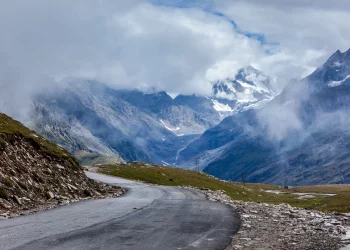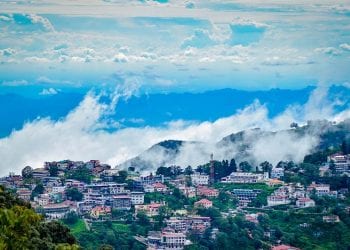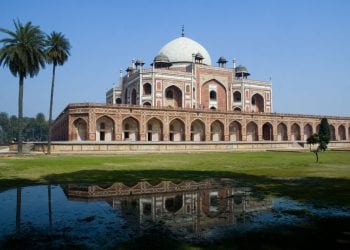Ranakpur Jain Temple
Temples are a significant part of any person’s life – from toddlers going to the temple to pray for their favourite toys to grandparents showing their devotion. People irrespective of their religion or caste, go to temples for various reasons – seeking inner peace, gazing at the beautiful architecture, becoming closer to God, or to simply explore the culture represented by it. Temples in India have a great significance, not only from a religious point of view but also from the tourism point of view. Tourists from all over the world come to India to visit temples like the Badrinath Temple, Konark Sun Temple, Somnath Temple, and more. Ranakpur Jain Temple in Rajasthan belongs to the list of famous temples in India.
About Ranakpur Jain Temple
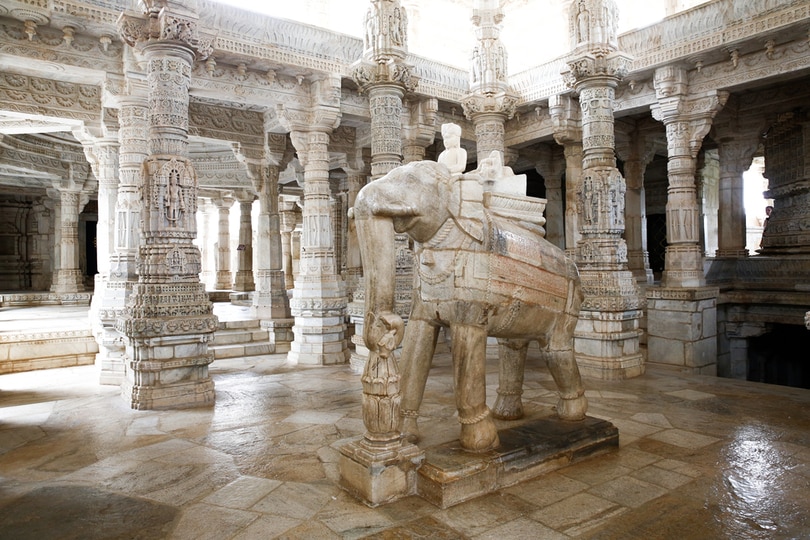
Ranakpur Jain Temple (also known as Chaturmukha Dharana Vihara) is a Jain temple dedicated to Tirthankara Rishabhanatha. Ranakpur Temple is one of the largest and most important temples in Jain culture. It is considered as one of the 5 most sacred places for Jains. The name of the temple is borrowed from the village named Ranakpur in the Pali district, which lies between Udaipur and Jodhpur in Rajasthan. Adinath, Neminath, Parshvanath, Surya, and Amba Matha are the deities worshipped here. Among them, the Adinath temple that is, Chaumukha, is the most famous and well known.
History
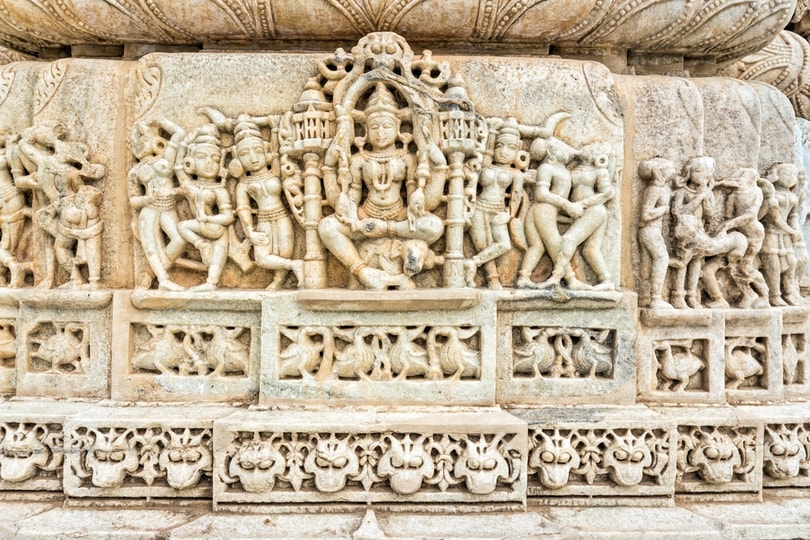
In the 15th century, a local Jain businessman named Darna Shah was determined to build a beautiful temple after he was inspired by a dream of a celestial vehicle. He called many renowned artists and sculptors to submit their plans and designs for the temple, but none of them matched the beauty he saw in his dream. Then, an architect named Deepak from Mundara presented a plan in front of Darna which profoundly impressed him. Deepak was a very carefree artist; he was someone who would prefer poverty if it came with serenity. He was deeply touched by the devotion of Darna and promised to create a temple which would prove to be as beautiful as Darna’s dream. He approached Rana Kumbha, who was the king of the province then, for land to build his building. Not only did Rana provided him with the land but he also advised Darna to create a town near the temple.
The construction of the temple started in 1389 and it continued till 1458 CE. However, a different source mentions that the construction continued until 1496. According to the audio guide provided to the tourists at the temple, it took 50 years to be completed and approximately two thousand seven hundred and eighty-five workers were involved. The temple and the town were named Ranpur after the name of King Kumbha Rana. Ranpur is also popularly known as Ranakpur.
This temple was even invaded by the Mughals and was once used as a home for dacoits. After a few years, it was re-discovered as made as a tourist attraction for everyone to see.
Architecture

Ranakpur Jain Temple is renowned for its splendid architecture. This temple was mentioned in the list of the 77 nominees for the Seven Wonders of the World because of its divine and splendid ancient architectural design.
The structure of Ranakpur Jain Temple is highly complex, having four different doorways to get into the chambers. These chambers ultimately take you to the main hall where the image of Adinath is positioned. The construction of the temple is such that no matter which of the four doorways you use, you will end up in the main courtyard. The temple comprises of twenty-nine halls and eighty domes.
Ranakpur Jain Temple is a three-storied marvel completely made out of light-coloured marble. There is a sudden drop in the temperature; you can feel the coolness in the air in contrast to the scorching heat of Rajasthan. It is famous for its intricate carving, and sculptural work. The temple is made in the form of Nalini-Gulma Vimana, which was the heavenly vehicle Darna Shah saw in his dreams.
The magnificent structure of the temple provides a celestial aesthetic to the temple. It is spread over 48,000 square feet of land. What is more fascinating is that it is supported by around 1400 intricately carved pillars and legend says that no two pillars in the temple are the same. The pillars are carved with beautiful ancient designs and you cannot help but gaze at the beauty and the intricate detailing of the designs there. Also, don’t try counting the pillars because it is impossible to do so because there are just so many of them.
The ancient architecture is so efficient that there is no need for artificial lighting in the temple, it is only illuminated by the natural light of the sun. The beautiful marble takes on different shades throughout the day. Not only the pillars and ceilings but the marble elephant, distinctive domes, shikhara, turrets, cupolas, etc are among the main attractions of the temple. One starts experiencing a feeling of calmness when they hear the sound of the hundred and eight-kilogram bells tolling. Interestingly, the temple has 84 underground chambers built to protect the Jain idols from the Mughals. The temple’s main attraction is the beautifully carved idol of Parshvanatha which is made out of a single marble slab.
Significance of the Temple
The scriptures in the Ranakpur Jain Temple have stories behind each of them. They talk about how the different preachers attained the state of nirvana and various lessons from their lives are carved into the walls of the temple.
The most significant and popular carving is of Lord Parshvanth. It is said that before he attained nirvana, he was a prince and had possession of all the worldly desires. He was travelling one day when he spotted a snake trapped in a pile of logs. Out of pity for the snake, the prince set the snake free. Turned out, the snake was trapped that way for a Yagna as an ascetic. By setting the snake free, he disturbed the ascetic. Years later when the prince had left all his worldly desires, the same ascetic tried to drown the prince by summoning a storm. The snake who was saved by the prince was reborn as Lord of Nagas and rushed to protect the prince by spreading his protective hood around him. The carving of this story is such that one cannot find the ends of the snake in the carving. It is so beautiful that one cannot help but marvel at the small detailing of each carving.
The temple is called Chaumukha Temple – Chau meaning four and Mukha meaning faces. This symbolises the quest in one’s life in four dimensions which is one of the key missions of Jainism. One of the main attractions is the idol of Lord Adinath which is four-faced. For the followers of Jainism, Ranakpur Jain Temple is of the utmost importance. It is one of the five most important pilgrimage sites for Jains and is also the largest temple among them.
Entry Fee and Timing for Ranakpur Jain Temple
If you’re worried about a lump sum entry fee for visiting this divine temple, fret not. There is no entry fee for visiting Ranakpur Jain Temple. However, this is a small fee for cameras and cell phones which is around Rs 100. Priests inside the temple will help the tourists by explaining the significance and the story behind the temple, but they might ask for a donation in return.
The tourists are allowed to explore the temple from 12:00 pm to 5:00 pm. The temple is open after noon for those who want to go and pray in the temple.
How to Reach Ranakpur Jain Temple?
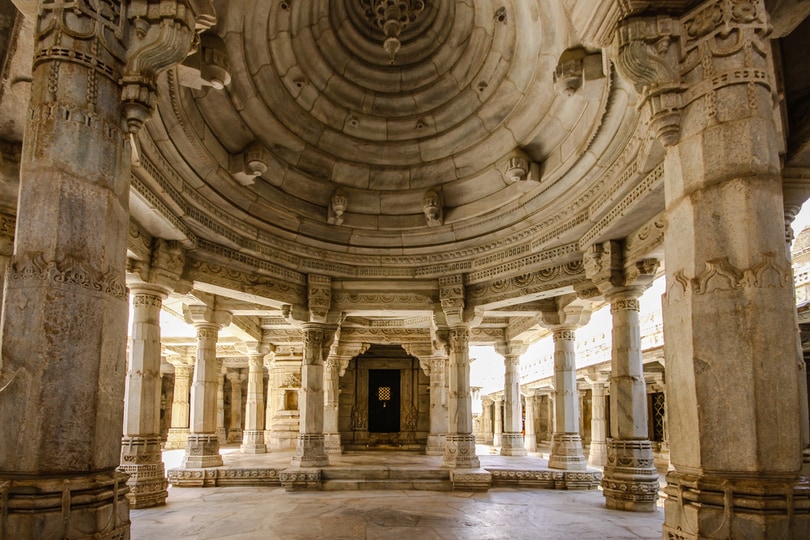
Tourists can choose between getting there by car or travelling by bus. If you prefer flights, the closest airport is Udaipur Domestic Airport, and the distance from Udaipur to Ranakpur Temple is 93 kilometres which is approximately a 2.5-hour drive. The closest railway station from the Ranakpur Jain Temple is in Falna, which is 36 kilometres away. One can even take a drive down from Jodhpur or Jaipur 156 kilometres and 357 kilometres respectively from the Ranakpur Jain Temple.
What is the Best Time to Visit Ranakpur Jain Temple?
The climate of Ranakpur is very tropical with the temperature rising to 42C and the minimum temperature being 22C during summers. Winters witness the maximum temperature of 20C and the minimum being 11C. October to March ie the winter season in Ranakpur is the best time to visit this Jain temple.
Things to Keep in Mind When Visiting Ranakpur Jain Temple
Being a significant temple for Jains as well as being a place of attraction for tourists, there are some things to be kept in mind while visiting this temple. For starters, bare shoulders and shorts are prohibited from the temple. One should be fully or semi-fully covered as it is a place of God. Scarves are available for a small fee at the ticket counter. Leather items like wallets, shoes, etc are not allowed inside the temple. There are lockers for keeping them safe, or you can leave them in your vehicle. The priests inside the temple are very helpful and will guide the tourists as per their requirements. They are well-versed in French and other foreign languages.
Best Places to Visit Near Ranakpur Jain Temple
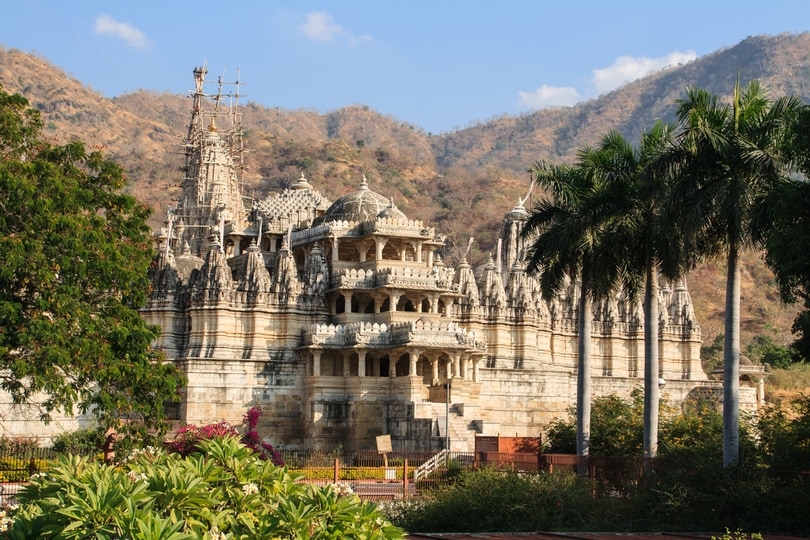
There are other beautiful temples in the vicinity of this magnificent temple. If one’s interested to explore a bit more, they can visit the beautiful Parshuram Mahadev Temple in Desuri tehsil in Pali. There’s also the Golden Temple located in Falna, which is 36 kilometres away from Ranakpur Jain Temple and also one of the main attractions of the area. Nimbo Ka Nath Mahadev Temple is another temple situated on the Falna to Sanderao route in Pali which is worth a visit.
If you want to go on a little getaway, Mt Abu is a perfect destination for you. It is a serene and calm hill station which is located just 160 kilometres away, approximately a 2.5-hour drive. The adventurous ones out there can go on a little hike in the mountains.
We hope this shot guide helps you while you go out to explore the Ranakpur Jain Temple!
P.s. You might like these related resources:
- Brahma Temple- A Spiritual Adventure To Pushkar, Rajasthan
- Must Visit These Places Near Udaipur On Your Weekend Vacation!
- Everything You Need to Know About This City Before You Plan To Visit!
Recent Posts
Top Picks

- OYO
 15 April, 2024
15 April, 2024 - Cultural Tour

- OYO
 15 April, 2024
15 April, 2024 - Cultural Tour

- OYO
 15 April, 2024
15 April, 2024 - Cultural Tour

- OYO
 15 April, 2024
15 April, 2024 - Cultural Tour

- OYO
 15 April, 2024
15 April, 2024 - Cultural Tour

Please rotate your device
Please go back to portrait mode for the best experience



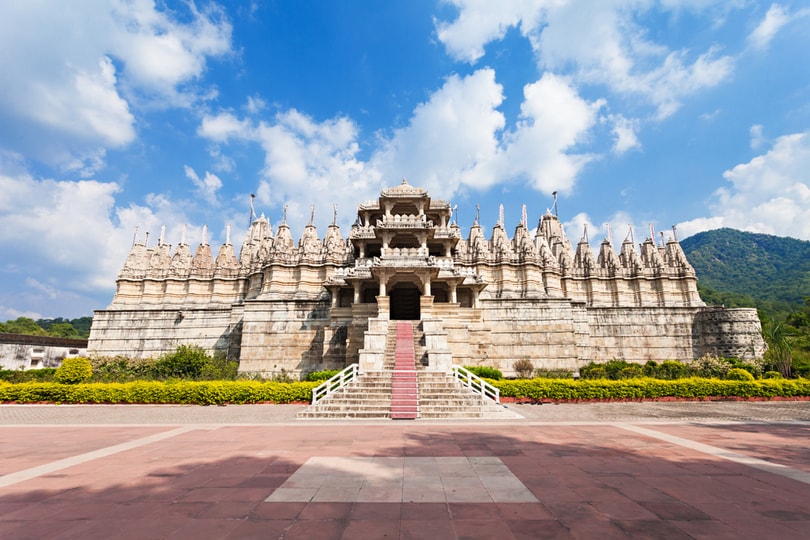

 April 15, 2024
April 15, 2024 